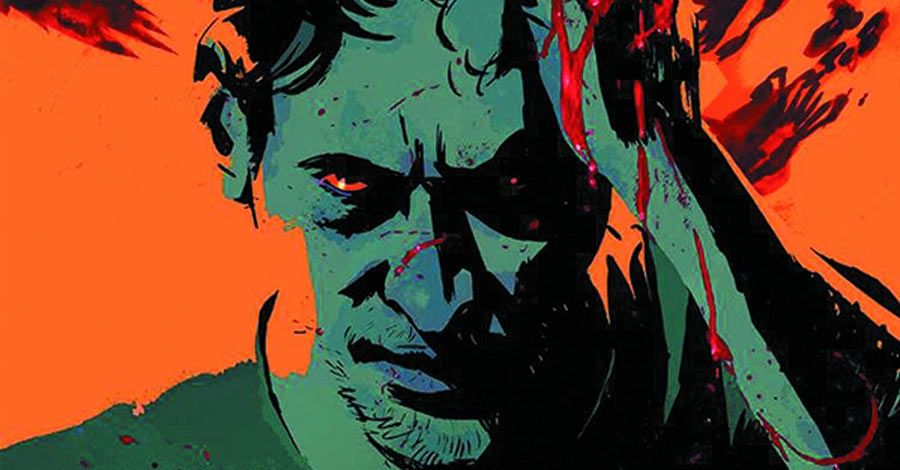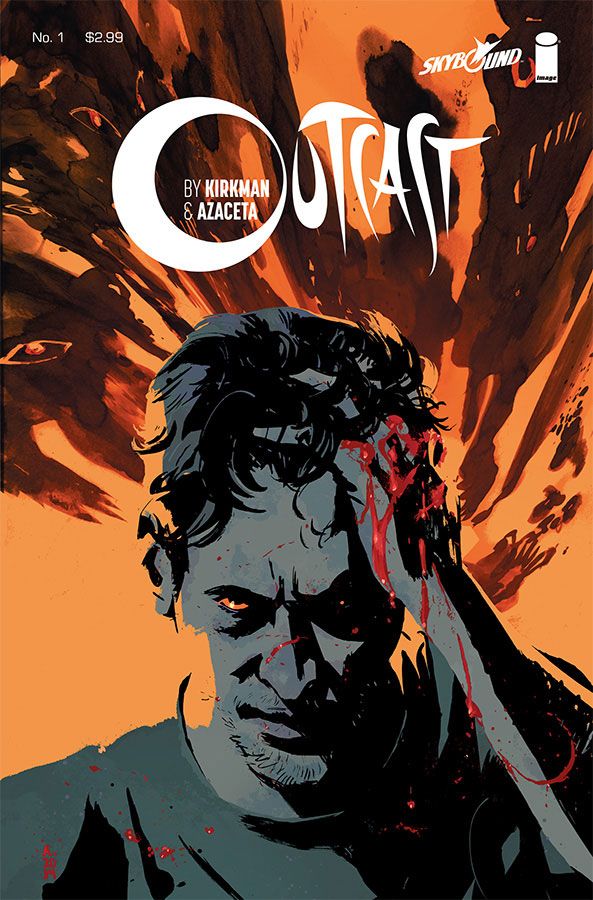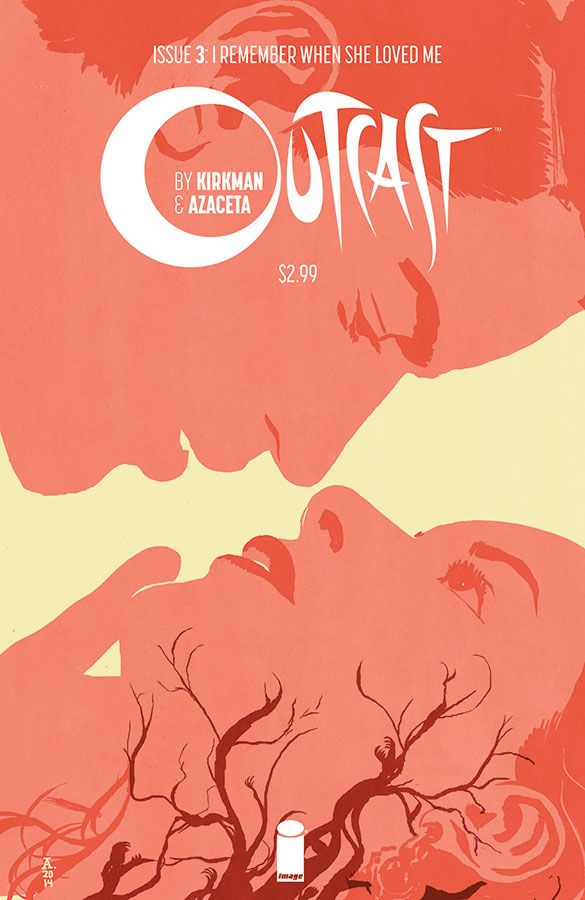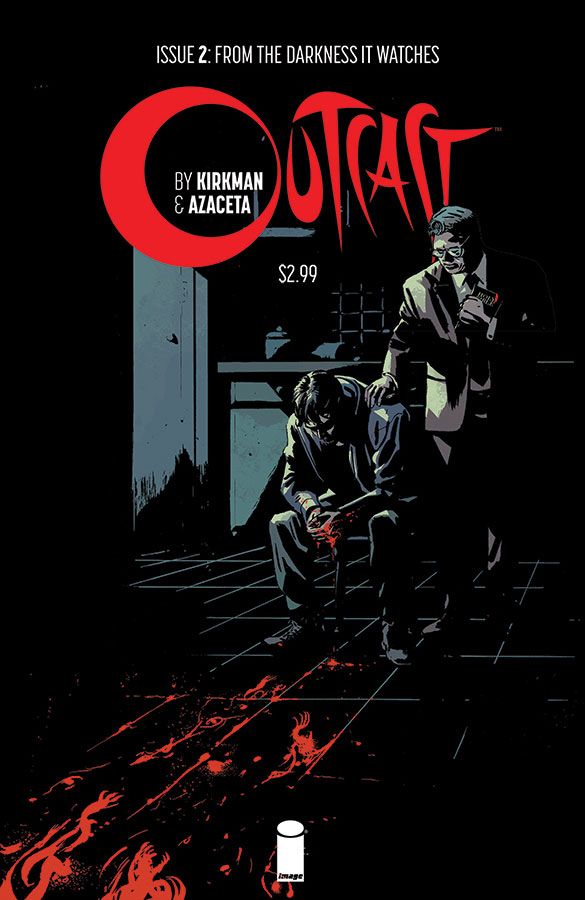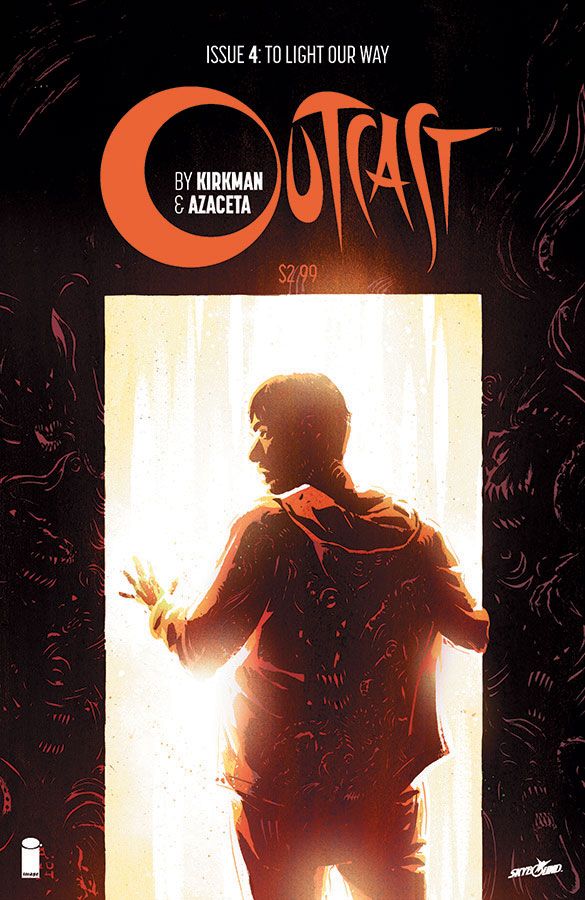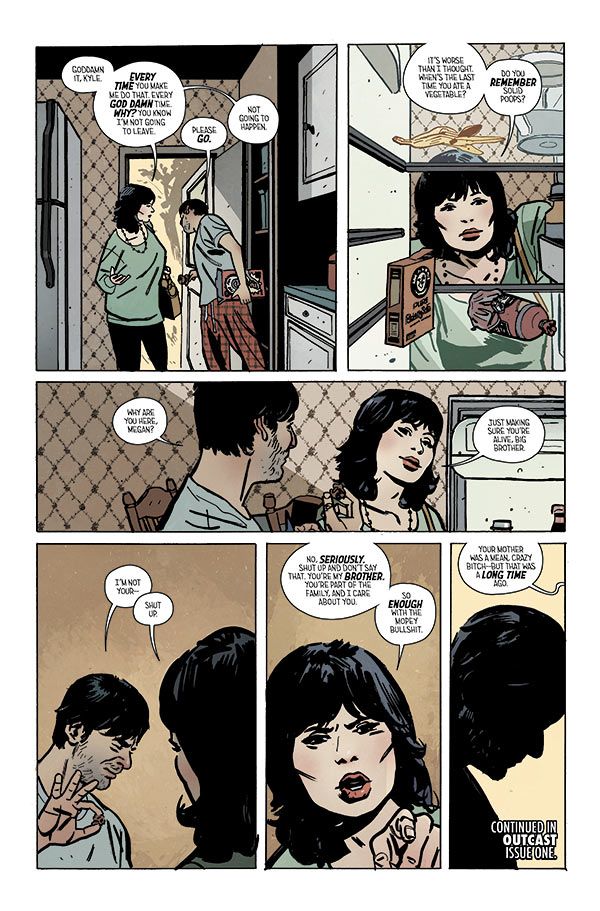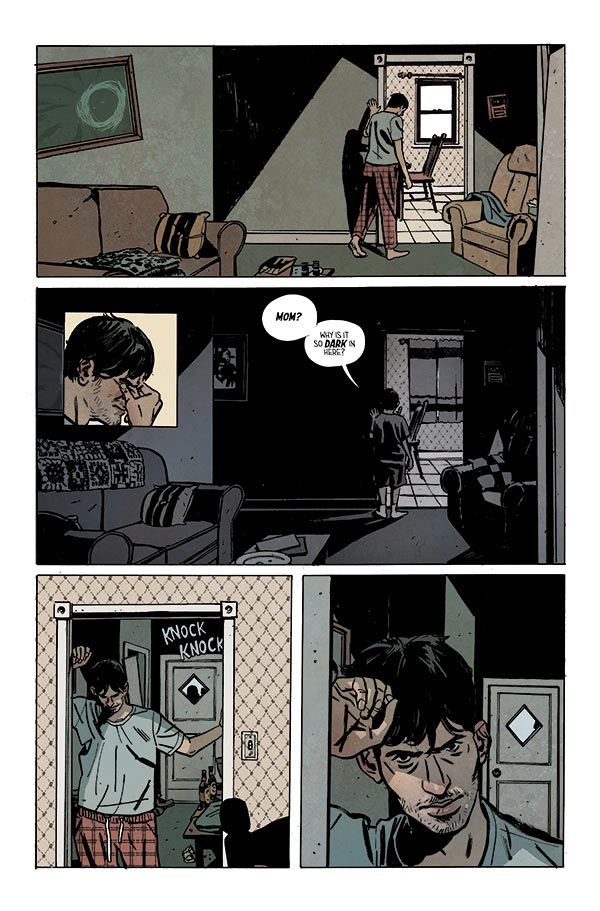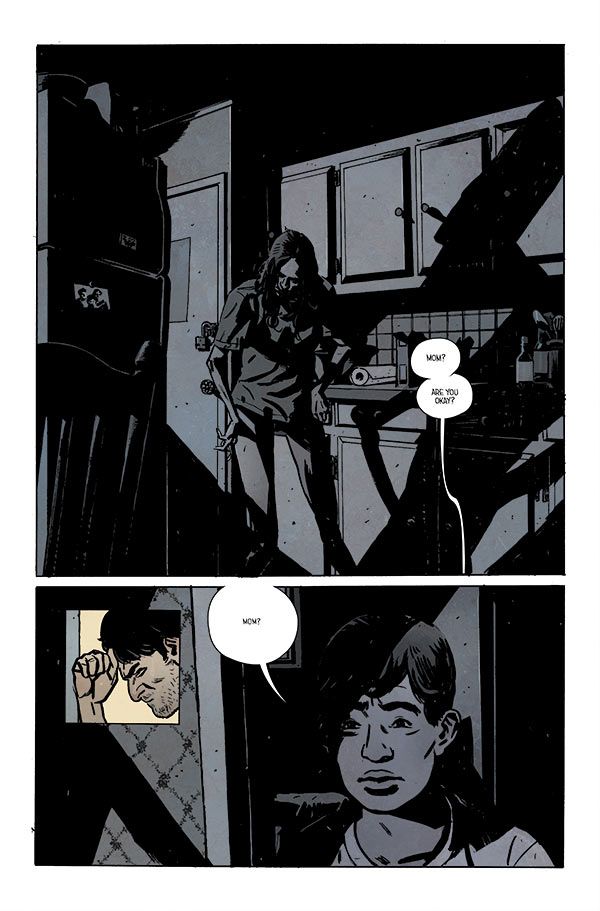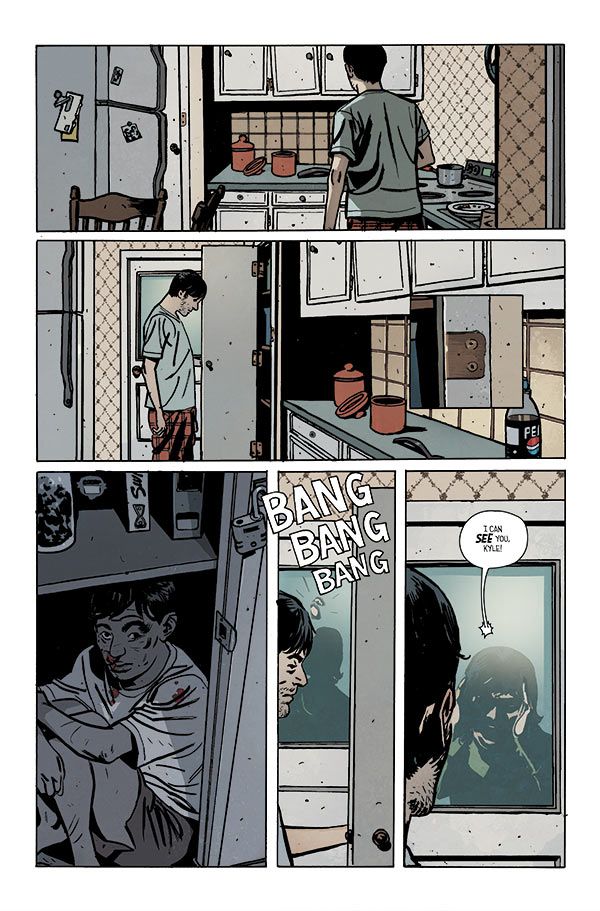Kyle Barnes is, like many of writer Robert Kirkman's best characters, an ordinary person dealing with extraordinary circumstances. Kyle's entire life has been shaped by dark forces working through those closest to him in the form of demonic possession. Set in a small town in West Virginia, "Outcast" is fresh take on the exorcism genre, drawing from Kirkman's own religious upbringing and brought to life by the inspired artwork of Paul Azaceta.
Not only is Kirkman writing the Skybound comic series, but also he's simultaneously adapting "Outcast" for Cinemax in partnership with Fox International. While the creator is no stranger to customizing his work for TV -- AMC's "The Walking Dead" has gnawed its way up the ratings charts four seasons strong -- the process of creating a series and pilot at the same time is not without its challenges.
IMAGE EXPO: Robert Kirkman Talks "Outcast," "Bitch Planet" & More
With "Outcast" hitting stores this week from Image Comics, CBR News compelled both creators to tell us more about Kyle and his demons, including the panels in issue #1 that creep Kirkman out, how the writer has been surprised by Azaceta's innovations and their goals to make the series as scary as possible.
CBR News: To get started, Robert, I'd love to find out what some of your all-time favorite horror movies are.
Robert Kirkman: Definitely "Alien" and "The Exorcist" as well as all of the Romero movies. I also really liked "I Am Legend" and other things by Richard Matheson. Those are the big ones. Actually, as a child I wasn't allowed to really watch horror movies, but every Halloween my parents would let me rent a horror movie as part of my celebrations. For like three years in a row, I rented "Hellraiser." That was the only horror movie I'd seen for a very long time. It wasn't until my later teen years that I actually got into horror, which is something I'm not going to do to my kids. I'm going to make sure they're watching horror movies when they're about ten or so, when they're actually more terrifying, and let them appreciate it more. I haven't had a lot of time to watch new stuff lately because I've been so busy, but I'm planning on watching "You're Next" this summer. That's my goal.
"Hellraiser" is an interesting choice. What brought you back to it, year after year?

Kirkman: Well, probably my religious upbringing to a certain extent. I like the concept of Hell; it's an interesting thing to explore. I guess I also just thought it was neat. Clive Barker is a talented guy.
Is your religious upbringing an influential component of "Outcast?"
Kirkman: Yeah, that's definitely a big part of why I've studied this genre and wanted to explore it a new way. I've always found this subject matter personally terrifying, just because of the different things I was told as a young child and the way I was brought up. Forcing myself to be immersed in this subject matter has been a very fun personal experience, I will admit, and hopefully it's leading to a better comic than it could've been otherwise. Otherwise, it's all for nothing and that would be upsetting. We'll see; I think it's turned out okay.
We've talked a bit in the past about your main character Kyle Barnes and how he's living alongside these possessions. Do you feel like he's an avatar for you in any way, maybe to confront those longstanding fears?
Kirkman: Potentially. To some extent, every character I write is an avatar of some aspect of myself, to either a large or small degree. I don't know if Kyle Barnes is a fictionalized version of me in any way, no more so than, say, Rick Grimes. They're both much better people than I am when it comes down to it.
When we spoke at Image Expo earlier this year, one of the things you'd said was that you wanted to make this book as scary as possible. Could you talk a little bit about your approach to that? Is it similar to the path you've taken with other work, like "The Walking Dead?"
Kirkman: Inherently, just concept-wise, situations in "The Walking Dead" can be scary, but zombies I've never really found to be that scary. They're interesting subject matter to follow, and they're very dangerous, but I've never found them to be scary just because of how unrealistic they are. It's not a situation that's ever really going to happen. While you can put yourself in the survival aspect of the situation, you can't really ever picture yourself having to fight off a re-animated corpse. By contrast, with "Outcast" there's some very real evidence out there that supports the possibility that demonic possession is a real phenomena. That's something that's very terrifying.
On top of that, I really have to hand it to Paul. I've been really taken aback and startled by how creepy he's been able to make the panels in this book. There are certainly panels in the first issue that I have trouble looking at for too long. There's a certain edge to it that makes it more unsettling than I thought possible on a comics page. Moving forward, I plan on trying to utilize that a lot more. Once I saw that he was able to do that, it opened up the possibilities to what we can do in this book, and that's very exciting.
Paul Azaceta: Horror is a tough thing to do in comics. In movies, you have music, sound effects, things that really help pull the viewer in. You also have the luxury of jump scares. The one thing I think comics can do well is creepy atmosphere. It's a slow build, slow burn kind of horror.
Paul, this is your first creator-owned book, and your first ongoing series. Is the creator-owned aspect of it strongly impacting your art?

Azaceta: Yeah, that's a great question, and it's the main reason why I took the book. When Kirkman told me the idea, I loved it, but personally getting to work on something this long term and creator-owned where I have input was the biggest thing for me. My main goal in the future as an artist is to do my own books -- writing and drawing. I'd like to be independent of anybody, really. I love collaborating, but I have stories that I want to tell. Having this experience with Kirkman, who is so successful at it, and getting to learn from him is incredible. I hope that by the end of this, him pushing me and me getting better as an artist, that I'll be able to do that.
Robert, did seeing Paul's strengths after the first issue was complete change or inspire the direction you had for "Outcast?"
Kirkman: Not really. I always had a really long roadmap for "The Walking Dead" and "Invincible," but they were much more open to examination and altercation. "Outcast" being something I've worked on for the last three years, there's a very fine story trajectory here. I'm actually starting this series that I plan on doing for many years knowing what the exact end point is -- and that's new for me. I'm on this course that can't really be altered, to a certain extent. We'll probably be adding a bit, but there's a very clear path. Seeing what Paul's capabilities are is helping me to expand certain scenes that I might not have dived into as deeply, initially, and he's opening my eyes to more possibilities -- ways to visually explore these scenarios that I hadn't anticipated.
What about you, Paul -- have there been any surprises for you in Robert's writing?
Azaceta: Yeah, in the first issue alone there were lots of surprises. It can be easy to forget, because it's a creator-owned book, that I don't have the same limits I'm used to from working at Marvel or DC. Like, with Wolverine, sure the claws are in there, but he's not going around just chopping people in half all the time. With this, we can really go and do whatever we want. So the violent stuff, Kirkman wants to make it real -- not cartoony violence. He emphasizes stuff like adding blood. Maybe it's just his demented brain that surprised me. [Laughter]
Robert -- you'd said in our last interview that you like stories with consequences. Could you talk a little bit about what the implications are for victims of possession in "Outcast?" Are they going to be held accountable for their actions when they weren't in control of their bodies?
Kirkman: That's something we're going to be exploring to a great degree moving forward in the series -- after the possession, are you responsible for the things you've done while you were possessed? It's really terrifying to think about the things you could do to the people closest to you under those circumstances. As you'll find throughout the series, Kyle's connections to these situations and how close he is to this phenomena affects a lot of things in some different and unexpected ways. He becomes a sort of catalyst for conflict, and a lot of things that come up in the story, Kyle will grow to find that he's somewhat responsible for. There are a lot of consequences that these characters will be dealing with to varying degrees.
Besides Kyle, can you tell me a bit about the other main characters?
Kirkman: One of our essential cast members is Reverend Anderson. He's a very big part of Kyle's life -- he actually knew him as a child. He's been performing exorcisms in this town for a while. He's our religious aspect of the book, where I see Kyle as more of a secular character. There's also Megan, Kyle's adopted sister, who will be a character that acts as a catalyst in his life. To a certain extent, a sense of emotion on this journey will be her in the first issue. 

We'll have a large cast as we move forward, and adding more characters -- and losing them -- as we go. This is a very dangerous world and I wouldn't get too close to some of the characters, but I hope that you do so you'll be moved when we lose them.
Paul, how far along are you with the art?
Azaceta: I'm well into the book now, and we're way ahead of stuff. I'm a little worried for later, since I've never done a monthly book, but we're both really trying to get as ahead as possible. It's a little different than anything I've ever done before. My approach is a lot more planning. For instance, Kyle's house -- the first time I drew it, I was just approaching it like I normally would. Then I realized that I would probably have to draw it like a thousand times, so I really needed to know what it looked like. It needed to make sense. I ended up doing a floor plan to keep track. I can't treat anything like a throwaway just in case Kirkman wants characters to return to a certain location.
Do you have a lot of freedom when it comes to the art?
Azaceta: I can't say its total freedom, but it's a really good collaboration. Robert sends me a script and I send him back thumbnails for notes. We go back and forth to figure things out. One thing that's really exciting about the scripts is that Robert came up with this idea of adding micro-panels -- they're like extra panels for adding atmosphere or notes, not necessarily things that have to do with the main action going on, but to highlight certain items in a scene. That's been a new way for me to lay out pages, but once I figured out how to use it, it's been fun to add those moments. It really helps in enhancing the atmosphere and this growing sense of terror.
Are you factoring the evolution of characters as they progress in this dangerous world into your character design?
Azaceta: Yeah, definitely. With Kyle, when you first see him, he's at probably the lowest point in his life. I had to capture that in his expressions and design, someone who isn't really taking care of himself, but also think about how that will change once he starts getting more positive about things. There are also flashbacks in the book, so we'll see younger versions of characters, or even like a before and after of a character, so I need to plan for that. In the beginning I was a little slower going because of it, because I want to figure things out now and set us up not to run into problems later, but now that it's all established, it's really fun.
Before we go, Robert, are there any updates with how "Outcast" is coming along as a TV show for Cinemax?
Kirkman: I've been developing it with Fox International, who handles "The Walking Dead" internationally, airing it in like 150 different countries worldwide. They're acting as a studio on this show, which is new for them. I've been developing it with them for over a year while working on the comic. That's been a really fun experience. Cinemax has come on as the network in the US, and we're expecting to hear some news on the pilot very soon. Hopefully I'll have some definitive things to say soon, but things are going extremely well and it's moving faster than any other project I've worked on in television. It's a tough balance between doing the comic and TV show at the same, but its been really, really fun.
Robert Kirkman and Paul Azaceta's "Outcast" debuts this week from Image Comics and Skybound.

